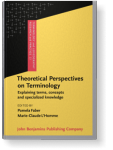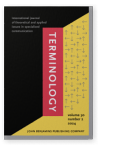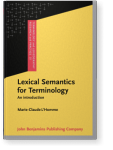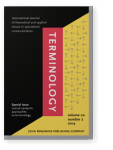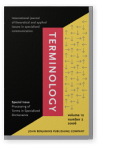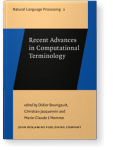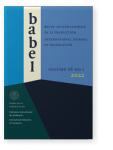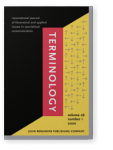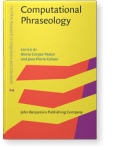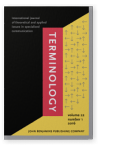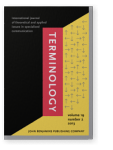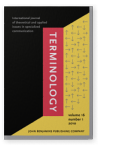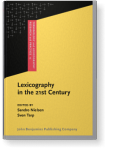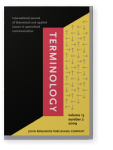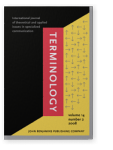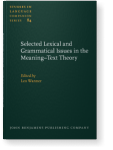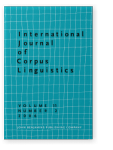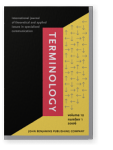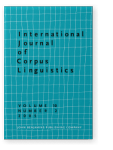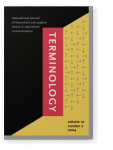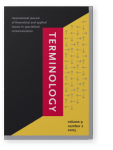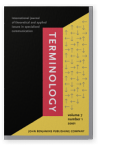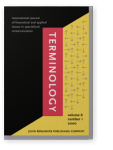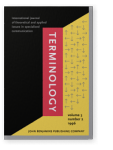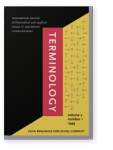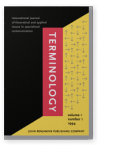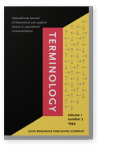Marie-Claude L'Homme
List of John Benjamins publications for which Marie-Claude L'Homme plays a role.
Book series
Journal
Theoretical Perspectives on Terminology: Explaining terms, concepts and specialized knowledge
Edited by Pamela Faber and Marie-Claude L'Homme
[Terminology and Lexicography Research and Practice, 23] 2022. vii, 598 pp.
Subjects Applied linguistics | Lexicography | Terminology
Lexical Semantics for Terminology: An introduction
Marie-Claude L'Homme
[Terminology and Lexicography Research and Practice, 20] 2020. xxi, 263 pp.
Subjects Lexicography | Semantics | Terminology
Lexical semantic approaches to terminology
Edited by Pamela Faber and Marie-Claude L'Homme
Special issue of Terminology 20:2 (2014) v, 161 pp.
Subjects Lexicography | Terminology
Processing of Terms in Specialized Dictionaries: New Models and Techniques
Edited by Marie-Claude L'Homme
Special issue of Terminology 12:2 (2006) 136 pp.
Subjects Lexicography | Terminology
Recent Advances in Computational Terminology
Edited by Didier Bourigault, Christian Jacquemin and Marie-Claude L'Homme
[Natural Language Processing, 2] 2001. xviii, 379 pp.
Subjects Corpus linguistics | Lexicography | Semantics | Terminology
2024 Managing polysemy in terminological resources Terminology 30:2, pp. 216–249 | Article
Polysemy, even when it is considered within specialized domains, is a recurrent phenomenon and the topic is debated from time to time in terminology literature. Part of this literature still advocates ways to prevent polysemy. Another portion recognizes the prevalence of polysemy, especially in… read more
2022 Theoretical perspectives on Terminology: An introduction Theoretical Perspectives on Terminology: Explaining terms, concepts and specialized knowledge, Faber, Pamela and Marie-Claude L'Homme (eds.), pp. 1–12 | Chapter
2022 Chapter 11. Terminology and Lexical Semantics Theoretical Perspectives on Terminology: Explaining terms, concepts and specialized knowledge, Faber, Pamela and Marie-Claude L'Homme (eds.), pp. 237–260 | Chapter
The relationship between Terminology and Linguistics has fluctuated, depending on the prevalence of specific applications at a given time. A conceptual basis remains important in applications such as knowledge representation, and standardization, but other applications rely more heavily on… read more
2022 Environment terms and translation students: A reading based on Frame Semantics Babel 68:1, pp. 55–85 | Article
This article reports on a pilot study that aims to shed some light on how translation students construe specialized terms. More specifically, we verified their ability to associate environment terms with specific conceptual situations (as understood by Frame Semantics [Fillmore 1976; Fillmore and… read more
2020 Diving into English motion verbs from a lexico-semantic approach: A corpus-based analysis of adventure tourism Terminology 26:1, pp. 33–59 | Article
This paper presents an analysis of English motion verbs in the specialized field of adventure tourism and proposes a terminological description of these verbs from a lexico-semantic approach. Motion verbs play a significant role in adventure tourism as they express central actions that are… read more
2020 Collecting collocations from general and specialised corpora: A comparative analysis Computational Phraseology, Corpas Pastor, Gloria and Jean-Pierre Colson (eds.), pp. 151–176 | Chapter
Collocations are increasingly taken into account in general and specialised repositories and methodologies to collect them are heavily based on corpora. However, lexicographers and terminologists use different kinds of corpora in which combinations are likely to behave according to specific… read more
2016 Opposite relationships in terminology Terminology 22:1, pp. 30–51 | Article
This article studies a family of semantic relationships that is often ignored in terminological descriptions, i.e. opposite relationships that include, but are not limited to, antonymy. We analyze English and French terms classified in an environmental database as opposites (Eng. polluting; green,… read more
2016 Review of Roldán Vendrell (2014): Terminología y comunicación científica y social Terminology 22:1, pp. 134–139 | Review
2014 Lexical semantic approaches to terminology: An introduction Lexical semantic approaches to terminology, Faber, Pamela and Marie-Claude L'Homme (eds.), pp. 143–150 | Article
2013 Review of Faber (2012): A Cognitive Linguistics View of Terminology and Specialized Language Terminology 19:2, pp. 282–287 | Review
2010 Automating the compilation of specialized dictionaries: Use and analysis of term extraction and lexical alignment Terminology 16:1, pp. 77–106 | Article
In this paper, we study how single-word term extraction and bilingual lexical alignment can be used and combined to assist terminologists when they compile bilingual specialized dictionaries. Two specific tools — namely a term extractor called TermoStat and a sentence and lexical aligner called… read more
2009 12. A methodology for describing collocations in a specialized dictionary Lexicography in the 21st Century: In honour of Henning Bergenholtz, Nielsen, Sandro and Sven Tarp (eds.), pp. 237–256 | Article
2009 Combining the semantics of collocations with situation-driven search paths in specialized dictionaries Terminology 15:2, pp. 258–283 | Article
The systematic presentation of collocations is increasingly recognized as a very useful addition to specialized reference works. However, few dictionaries or terminological databases actually include this kind of data. More surprisingly still, no method has been designed yet to allow efficient… read more
2008 Reflecting on fifteen years of research and development in terminology Terminology 14:2, pp. 153–157 | Article
2007 Using Explanatory and Combinatorial Lexicology to Describe terms Selected Lexical and Grammatical Issues in the Meaning–Text Theory: In honour of Igor Mel'čuk, Wanner, Leo (ed.), pp. 167–202 | Article
2006 Discovering and organizing noun-verb collocations in specialized corpora using inductive logic programming International Journal of Corpus Linguistics 11:2, pp. 209–243 | Article
This article presents a method for discovering and organizing noun-verb (N-V) combinations found in a French corpus on computing. Our aim is to find N-V combinations in which verbs convey a “realization meaning” as defined in the framework of lexical functions (Mel’čuk 1996, 1998). Our approach,… read more
2006 The processing of terms in dictionaries: New models and techniques: A state of the art Processing of Terms in Specialized Dictionaries: New Models and Techniques, L'Homme, Marie-Claude (ed.), pp. 181–188 | Article
2005 Two methods for extracting “specific” single-word terms from specialized corpora: Experimentation and evaluation International Journal of Corpus Linguistics 10:2, pp. 227–255 | Article
Recently, corpus comparison has been used by a number of researchers for extracting single-word terms (SWTs) from specialized corpora. It is viewed as a means to supplement multi-word term (MWT) extraction, the focus of which is on noun phrases. However, little is known about the value of this… read more
2004 Ingrid Meyer, Terminologist (1957–2004) Terminology 10:2, pp. 183–188 | Article
2003 Terminology during the past decade (1994–2004): An Editorial statement Terminology 9:2, pp. 151–161 | Article
2001 Introduction Recent Advances in Computational Terminology, Bourigault, Didier, Christian Jacquemin and Marie-Claude L'Homme (eds.), pp. viii–xviii | Miscellaneous
2001 Editorial Statement Terminology 7:1, pp. 1–5 | Miscellaneous
2000 Understanding specialized lexical combinations Terminology 6:1, pp. 89–109 | Article
1996 Definition of an evaluation grid for term-extraction software Terminology 3:2, pp. 291–312 | Article
This paper examines evaluation criteria for term-extraction software. These tools have gained popularity over the past few years, but they come in all sorts of structures and their performance cannot be compared (qualitatively) to that of humans performing the same task. The lists obtained after… read more
1995 Processing word combinations in existing term banks Terminology 2:1, pp. 141–162 | Article
Word combinations (phraseological units, collocations, etc.) pose practical as well as theoretical problems in terminology and in linguistics in general. This paper examines how specific word combinations can be stored in computerized reference tools. The focus is on word lexical groups in special… read more
1994 Management of terminology in a machine-translation environment Terminology 1:1, pp. 121–135 | Article
The input and organization of terms play a central role in a dictionary-based translation system. The quality of the output text depends, for the most part, on the development of the dictionary. However, a lexical database cannot solve all problems of ambiguity. Moreover, it cannot take into… read more
1994 A model for the definition of concepts: Rules for analytical definitions in terminological databases Terminology 1:2, pp. 351–373 | Article
The pattern of existing terminological definitions is analysed, and a model for the terminological definition of concepts is proposed that is considered more appropriate to data-processing applications than present patterns of definition. The model consists of a regularised form of the traditional… read more
